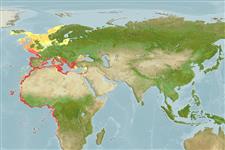Preferred temperature (Ref.
115969): 9.5 - 15.3, mean 13.3 (based on 283 cells).
Phylogenetic diversity index (Ref.
82804): PD
50 = 0.5625 [Uniqueness, from 0.5 = low to 2.0 = high].
Bayesian length-weight: a=0.00372 (0.00160 - 0.00860), b=3.15 (2.94 - 3.36), in cm Total Length, based on LWR estimates for this (Sub)family-body shape (Ref.
93245).
营养阶层 (Ref.
69278): 3.1 ±0.3 se; based on diet studies.
回复力 (Ref.
120179): 非常低的, 最小族群倍增时间超过14 年 (Fec=7).
Fishing Vulnerability (Ref.
59153): Very high vulnerability (90 of 100).
Climate Vulnerability (Ref.
125649): Moderate vulnerability (38 of 100).
